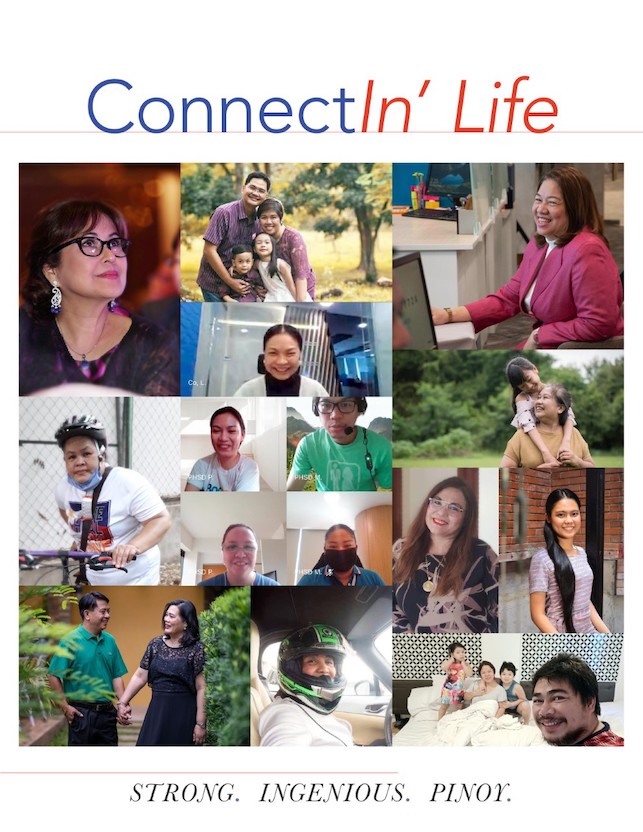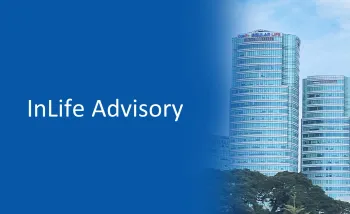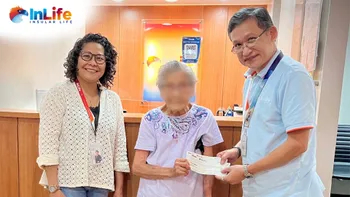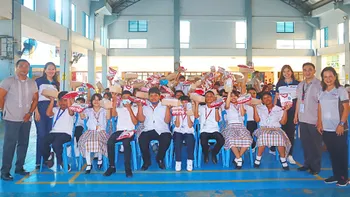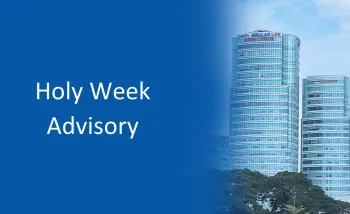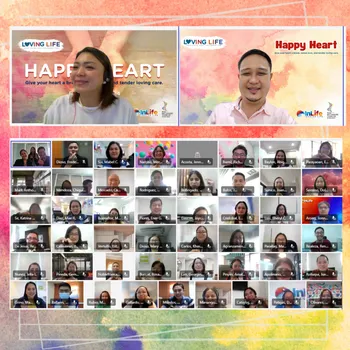Nina Aguas: Pivoting Life And Work Balance In A Global Pandemic
November 23, 2020
Nina Aguas: Pivoting Life And Work Balance In A Global Pandemic
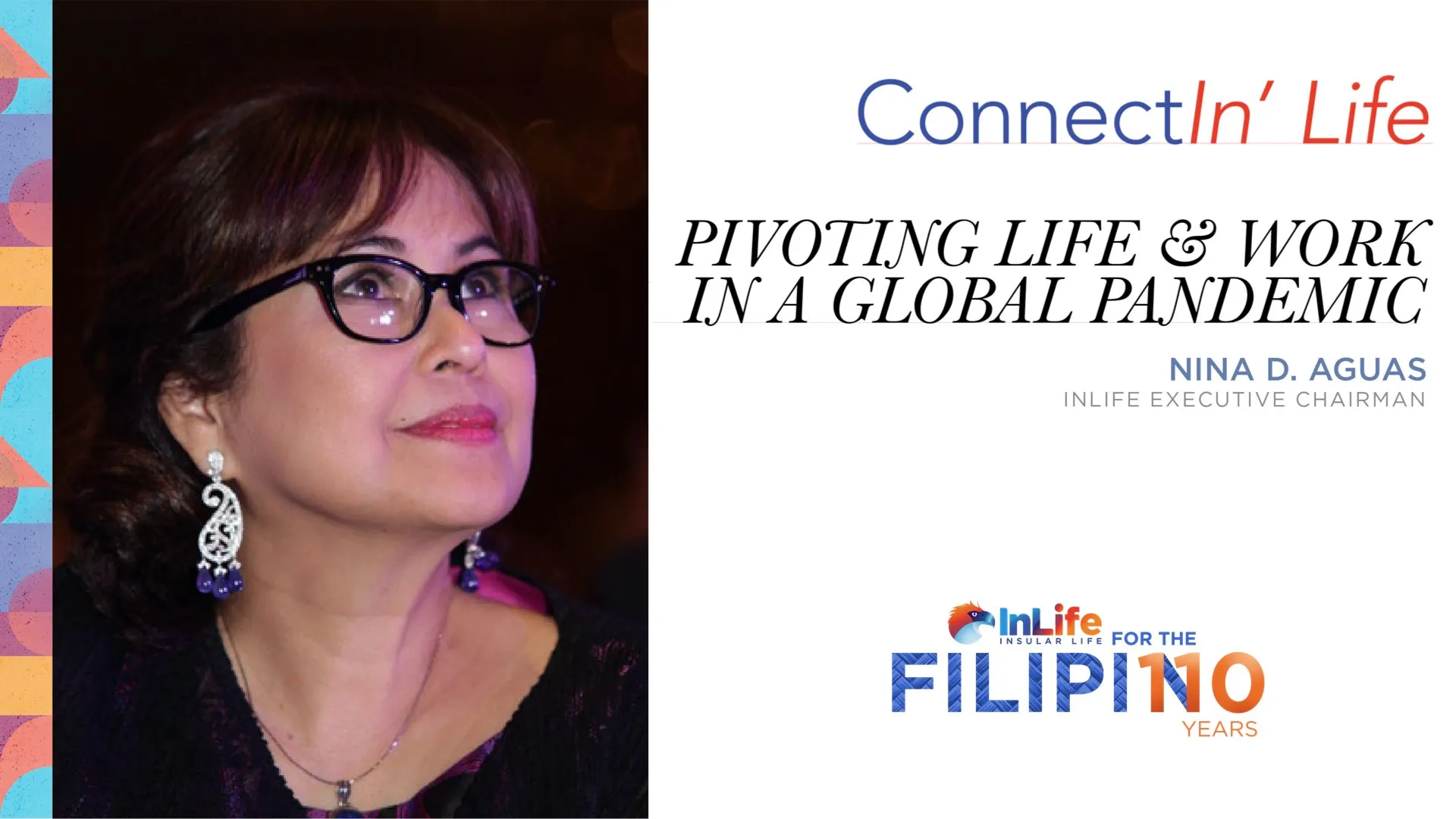
As the global pandemic shuts down businesses and drives economies into recession, a woman is leading the first and biggest Filipino-owned life insurance company through the most complex crisis of this generation.
Nina D. Aguas, Executive Chairman of Insular Life Assurance Co. Ltd. (InLife), draws wisdom and strength from the company’s 110 years of history—surviving, evolving, and emerging stronger from every crisis. Since she took over the helm of InLife in 2016, first as CEO and then as Executive Chair, the first woman to occupy these positions in the company —InLife has averaged double-digit growth in revenues, developed a solid digital infrastructure, launched a movement for the financial and social empowerment of women, and reaped international awards for excellence.
This year, InLife was again named Best Domestic Life Insurer by the Insurance Asia Awards, for the fourth consecutive year.
In this interview, Nina one of Forbes’ 25 Power Businesswomen in Asia 2019, and one of Business Insider Australia's 100 People Transforming Business in Asia, talks about living and leading in the time of COVID-19.
Q: Can you describe 2020 in a word?
NINA: It’s way too universal and life- and game-changing for anyone to define in one word, so I have three words: profound, mystifying, surreal.
Surreal because it’s almost unreal, like watching a science fiction movie, that this (pandemic) would happen to humankind. It’s global, the effects know no boundaries. It touches the high and mighty, the poor and the weak, the young and old, the men, women, and whoever is in between. It exempts no one.
Mystifying for how can anyone imagine and conceive this phenomenon. We were very hopeful going into 2020, a new decade, and a fresh outlook; even optometrists use 20-20 when vision is ideal.
Profound because we were all deeply and intensely impacted. Our parents had to live through World War 2; our generation was handed a world war that needed layers and complex solutions but was equally emotionally difficult. It’s unbelievable, unprecedented—there’s no playbook to handle something this difficult.
That’s why they say: man plans, God humors. He laughs at our plans. We always felt we were in control of our destinies, of what’s within our reach, within our world, within our side. But no, during confinement and lockdown, we realize Someone else beyond us was in control.
Q: What has the year been like for you as an executive, a Filipino, and a woman?
NINA: It’s defining on so many levels. I am thriving. I embraced and spiritualized the conditions. By the grace of God, I feel I have become an even better version of myself. Maybe I’m an optimist by disposition.
My daily life has taken on a better rhythm, a better tempo. It slowed me down, allowed me to breathe deeply. There was no pressure to be in a given place. I was in better control of my time. The confinement, while limiting, also expanded the time I gave my family. I saw more of my house in the last six months than I have in the 17 years we lived there. I appreciate the garden, the magnificent trees, the dragonflies and butterflies, the birds, the blue skies. You hear the rain and sense all of that smell, flavor and scent. It never dawned on me how I relished and missed those moments because I had to be at work in the office or away for my postings abroad.
(As an executive) The topmost priority for me was keeping our people safe and securing our company. Our business paused but momentarily and as the gravity of the situation began to sink in, we forged ahead confidently because of the strength and resilience of our balance sheet and our digital capability. Our agents adapted very well to the automated system (80% adoption). Only 18% of our people come to the office. The rest are on work-from-home arrangements. I’ve only been to the office very few times in the past six months.
Q: Digital is the backbone of your operations now. Were you prepared for it?
NINA: We were very prepared because, in recent years, we went through a dual transformation strategy: reimagining today, and building the business model of the future. Future-proofing the business was heavily digital and technology powered. We said this is what we will invest in, and we’ve done so much in the last four years, creating a solid digital infrastructure and systems that allow for innovations. Despite the lockdowns, we were quite agile in our response. Even while on quarantine, we were able to put up InLife and Insular Health Care e-stores and offered affordable life insurance and prepaid health insurance online, as well as open new digital payment facilities. Our people are not one to waste a crisis. We were able to implement a seamless execution for our stakeholders.
Q: Have you made any changes in your personal or work life due to the pandemic?
NINA: I cannot imagine anyone who did not. I always said that life is a team sport but because of the limitations, we were not able to go to work, school, church, to gather as a family. The thing I miss most is the personal interaction. We continue to work from home. It’s ironic, how home confinement gave many of us room for reflection, spirituality, and creativity.
Q: As a champion of women’s empowerment, what do you think is the biggest impact of this crisis on women?
NINA: Women are disproportionately employed in health and associated sectors operating in the frontline of COVID-19, so the risk is at different levels.
1. If they’re breadwinners of a family, they also need to provide for daycare when they’re at work. Looking after the needs of the family becomes a shared responsibility to allow for some time and space for the mother or father. Everyone must pull together at home.
2. While we’re promoting economic and financial independence, we were setback because you can’t gather women and rally them when they have to deal with the absence of home support, deal with the day-to-day, and put food on the table. Sometimes the partner loses his job. Aside from coping with the financial loss, the wives and the mothers are expected to help with the emotional and psychological impact all these have brought to the family.
3. The April 2020 report of UN Women titled Gender Snapshot: Covid-19 in the Philippines revealed that one in five women aged 15 to 49 years has experienced violence at least once in their lifetime, and that’s exacerbated by the conditions families face now. We believed one way to free them was education and heightened awareness, but the safeguards against the spread of the virus have limited our ability to reach out proactively to them. This is momentary, we should get back to better and healthier times.
Q: As a business leader, what are your thoughts on the Philippines’ economic prospects in the next five years?
NINA: Until there are solutions, vaccines, or better ways of living and co-existing with the (COVID-19) spread, our economic prospects are handicapped. We need to bring back fully the country’s economic activities and create and restore a strong demand for goods and services to fuel recovery. We must regain our confidence, take hold of our bearings, and face our fears.
I remain optimistic but recovery may take a little bit longer – early 2022, maybe. The choice is between life because of the public health crisis, and life because of the loss of livelihood. It’s between a rock and a hard place. You have to draw from your inner strength to be able to survive this. When I was asked what I would say to leaders like me, I said: 1) Stay alive; 2) Keep the faith and be grateful, so you realize how little you need to live beautifully on Earth; and 3) Look out for your people, your communities; look out for your country. When you do right by them, when things normalize, they will remember. Rewards may not come today or tomorrow, but they will come when you need them most.
Q: Where do you position Insular Life in this kind of landscape?
NINA: We embarked, in July, on a Rapid Revenue Recovery plan. Let’s see whether we could get back to the same level of business 2018-2019. Let’s look at customer sentiment. People have been clamoring for health care solutions, so we offered health care prepaid cards at very affordable prices—the pick-up was unexpectedly high. It was adding to the top line, but as with any prepaid low-cost insurance, margins are very lean, but that’s okay. We are helping thousands who need health protection the most at this time.
We must recover momentum, so we are careful with spending especially on infrastructure and property, and then save where we can. This is what we are doing now, and this will continue until 2021.
Q: You are at the helm of a company that’s been around for 110 years. What has history taught InLife that equips it to help Filipinos through this pandemic?
NINA: We’ve outlived a war and several financial crises because we stayed true to our core corporate values - the love of God and country, excellence, respect for the individual, integrity, and teamwork. If I look out for my people and my community, they will look out for me in the future.
We’re very watchful, careful, agile, decisive. We cannot equivocate. We have very experienced people. Experience teaches you in ways you will never forget.
Q: How do you reassure people who are struggling financially and emotionally right now?
NINA: In times like this, when the need exceeds the capacity of anyone giver to fill, we are all asked to give fearlessly. As they say, no one is too poor not to be able to offer something, a smile or a comforting hug, and no one is too rich as not to need anything; they might need the same hug and support.
Q: You speak a lot about your faith. What is the role of your faith in bringing you where you are now?
NINA: I feel blessed that I was born from a family of faith. Everything that happened to me was born by faith, so I live my life through that faith. That’s why I believe in destiny; I believe you are placed in a position for a reason and if you embrace that, you cannot be in a bad place. Everyone is saying, you’re recognized by Forbes, Business Insider, etc., all totally unexpected —the accountability of those recognitions, is a bigger responsibility. You have to continue making a positive impact. Success is relative. I can just as well change a light bulb; I clean the bathroom, do my groceries, plan the menu, look out for my family, laugh out loud with friends—it’s all those things, too.
To read stories of connecting lives for good, download InLife's 110th Anniversary Magazine.
Nina D. Aguas, Executive Chairman of Insular Life Assurance Co. Ltd. (InLife), draws wisdom and strength from the company’s 110 years of history—surviving, evolving, and emerging stronger from every crisis. Since she took over the helm of InLife in 2016, first as CEO and then as Executive Chair, the first woman to occupy these positions in the company —InLife has averaged double-digit growth in revenues, developed a solid digital infrastructure, launched a movement for the financial and social empowerment of women, and reaped international awards for excellence.
This year, InLife was again named Best Domestic Life Insurer by the Insurance Asia Awards, for the fourth consecutive year.
In this interview, Nina one of Forbes’ 25 Power Businesswomen in Asia 2019, and one of Business Insider Australia's 100 People Transforming Business in Asia, talks about living and leading in the time of COVID-19.
Q: Can you describe 2020 in a word?
NINA: It’s way too universal and life- and game-changing for anyone to define in one word, so I have three words: profound, mystifying, surreal.
Surreal because it’s almost unreal, like watching a science fiction movie, that this (pandemic) would happen to humankind. It’s global, the effects know no boundaries. It touches the high and mighty, the poor and the weak, the young and old, the men, women, and whoever is in between. It exempts no one.
Mystifying for how can anyone imagine and conceive this phenomenon. We were very hopeful going into 2020, a new decade, and a fresh outlook; even optometrists use 20-20 when vision is ideal.
Profound because we were all deeply and intensely impacted. Our parents had to live through World War 2; our generation was handed a world war that needed layers and complex solutions but was equally emotionally difficult. It’s unbelievable, unprecedented—there’s no playbook to handle something this difficult.
That’s why they say: man plans, God humors. He laughs at our plans. We always felt we were in control of our destinies, of what’s within our reach, within our world, within our side. But no, during confinement and lockdown, we realize Someone else beyond us was in control.
Q: What has the year been like for you as an executive, a Filipino, and a woman?
NINA: It’s defining on so many levels. I am thriving. I embraced and spiritualized the conditions. By the grace of God, I feel I have become an even better version of myself. Maybe I’m an optimist by disposition.
My daily life has taken on a better rhythm, a better tempo. It slowed me down, allowed me to breathe deeply. There was no pressure to be in a given place. I was in better control of my time. The confinement, while limiting, also expanded the time I gave my family. I saw more of my house in the last six months than I have in the 17 years we lived there. I appreciate the garden, the magnificent trees, the dragonflies and butterflies, the birds, the blue skies. You hear the rain and sense all of that smell, flavor and scent. It never dawned on me how I relished and missed those moments because I had to be at work in the office or away for my postings abroad.
(As an executive) The topmost priority for me was keeping our people safe and securing our company. Our business paused but momentarily and as the gravity of the situation began to sink in, we forged ahead confidently because of the strength and resilience of our balance sheet and our digital capability. Our agents adapted very well to the automated system (80% adoption). Only 18% of our people come to the office. The rest are on work-from-home arrangements. I’ve only been to the office very few times in the past six months.
Q: Digital is the backbone of your operations now. Were you prepared for it?
NINA: We were very prepared because, in recent years, we went through a dual transformation strategy: reimagining today, and building the business model of the future. Future-proofing the business was heavily digital and technology powered. We said this is what we will invest in, and we’ve done so much in the last four years, creating a solid digital infrastructure and systems that allow for innovations. Despite the lockdowns, we were quite agile in our response. Even while on quarantine, we were able to put up InLife and Insular Health Care e-stores and offered affordable life insurance and prepaid health insurance online, as well as open new digital payment facilities. Our people are not one to waste a crisis. We were able to implement a seamless execution for our stakeholders.
Q: Have you made any changes in your personal or work life due to the pandemic?
NINA: I cannot imagine anyone who did not. I always said that life is a team sport but because of the limitations, we were not able to go to work, school, church, to gather as a family. The thing I miss most is the personal interaction. We continue to work from home. It’s ironic, how home confinement gave many of us room for reflection, spirituality, and creativity.
Q: As a champion of women’s empowerment, what do you think is the biggest impact of this crisis on women?
NINA: Women are disproportionately employed in health and associated sectors operating in the frontline of COVID-19, so the risk is at different levels.
1. If they’re breadwinners of a family, they also need to provide for daycare when they’re at work. Looking after the needs of the family becomes a shared responsibility to allow for some time and space for the mother or father. Everyone must pull together at home.
2. While we’re promoting economic and financial independence, we were setback because you can’t gather women and rally them when they have to deal with the absence of home support, deal with the day-to-day, and put food on the table. Sometimes the partner loses his job. Aside from coping with the financial loss, the wives and the mothers are expected to help with the emotional and psychological impact all these have brought to the family.
3. The April 2020 report of UN Women titled Gender Snapshot: Covid-19 in the Philippines revealed that one in five women aged 15 to 49 years has experienced violence at least once in their lifetime, and that’s exacerbated by the conditions families face now. We believed one way to free them was education and heightened awareness, but the safeguards against the spread of the virus have limited our ability to reach out proactively to them. This is momentary, we should get back to better and healthier times.
Q: As a business leader, what are your thoughts on the Philippines’ economic prospects in the next five years?
NINA: Until there are solutions, vaccines, or better ways of living and co-existing with the (COVID-19) spread, our economic prospects are handicapped. We need to bring back fully the country’s economic activities and create and restore a strong demand for goods and services to fuel recovery. We must regain our confidence, take hold of our bearings, and face our fears.
I remain optimistic but recovery may take a little bit longer – early 2022, maybe. The choice is between life because of the public health crisis, and life because of the loss of livelihood. It’s between a rock and a hard place. You have to draw from your inner strength to be able to survive this. When I was asked what I would say to leaders like me, I said: 1) Stay alive; 2) Keep the faith and be grateful, so you realize how little you need to live beautifully on Earth; and 3) Look out for your people, your communities; look out for your country. When you do right by them, when things normalize, they will remember. Rewards may not come today or tomorrow, but they will come when you need them most.
Q: Where do you position Insular Life in this kind of landscape?
NINA: We embarked, in July, on a Rapid Revenue Recovery plan. Let’s see whether we could get back to the same level of business 2018-2019. Let’s look at customer sentiment. People have been clamoring for health care solutions, so we offered health care prepaid cards at very affordable prices—the pick-up was unexpectedly high. It was adding to the top line, but as with any prepaid low-cost insurance, margins are very lean, but that’s okay. We are helping thousands who need health protection the most at this time.
We must recover momentum, so we are careful with spending especially on infrastructure and property, and then save where we can. This is what we are doing now, and this will continue until 2021.
Q: You are at the helm of a company that’s been around for 110 years. What has history taught InLife that equips it to help Filipinos through this pandemic?
NINA: We’ve outlived a war and several financial crises because we stayed true to our core corporate values - the love of God and country, excellence, respect for the individual, integrity, and teamwork. If I look out for my people and my community, they will look out for me in the future.
We’re very watchful, careful, agile, decisive. We cannot equivocate. We have very experienced people. Experience teaches you in ways you will never forget.
Q: How do you reassure people who are struggling financially and emotionally right now?
NINA: In times like this, when the need exceeds the capacity of anyone giver to fill, we are all asked to give fearlessly. As they say, no one is too poor not to be able to offer something, a smile or a comforting hug, and no one is too rich as not to need anything; they might need the same hug and support.
Q: You speak a lot about your faith. What is the role of your faith in bringing you where you are now?
NINA: I feel blessed that I was born from a family of faith. Everything that happened to me was born by faith, so I live my life through that faith. That’s why I believe in destiny; I believe you are placed in a position for a reason and if you embrace that, you cannot be in a bad place. Everyone is saying, you’re recognized by Forbes, Business Insider, etc., all totally unexpected —the accountability of those recognitions, is a bigger responsibility. You have to continue making a positive impact. Success is relative. I can just as well change a light bulb; I clean the bathroom, do my groceries, plan the menu, look out for my family, laugh out loud with friends—it’s all those things, too.
To read stories of connecting lives for good, download InLife's 110th Anniversary Magazine.
